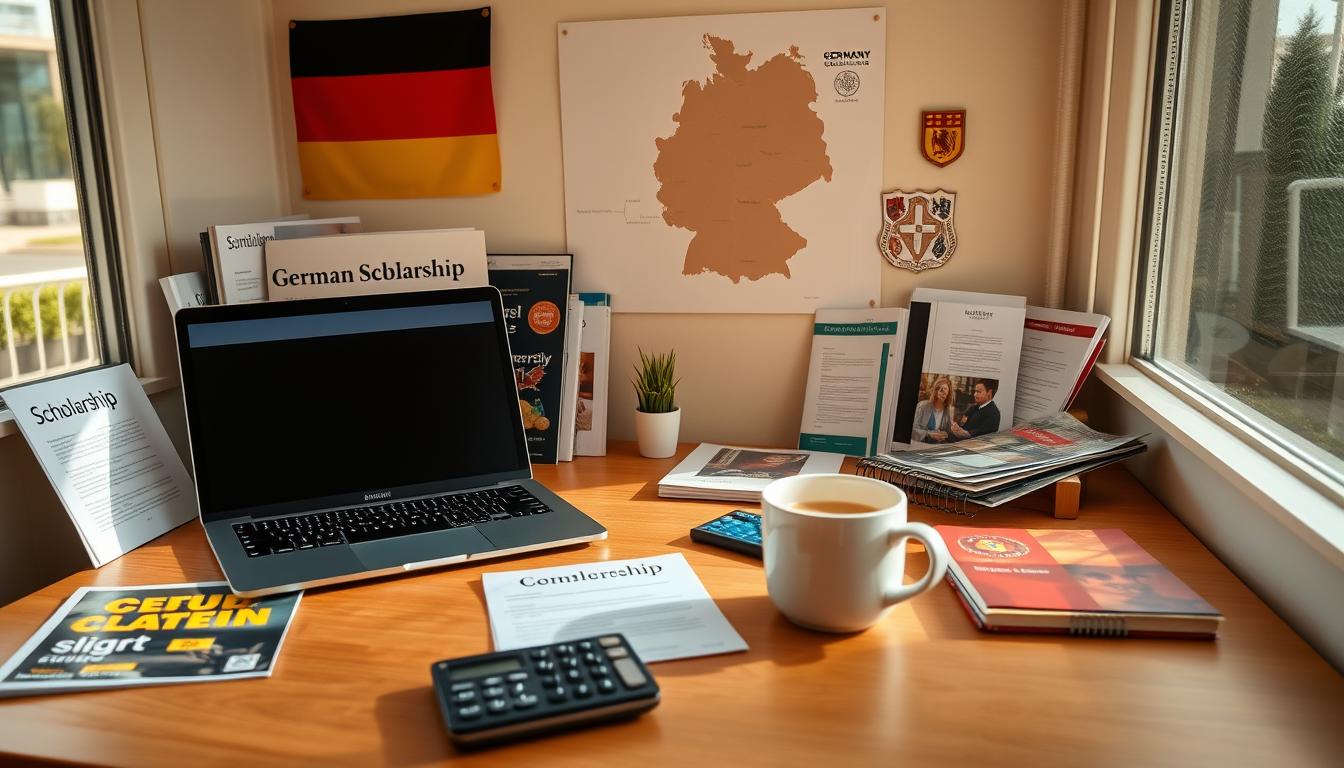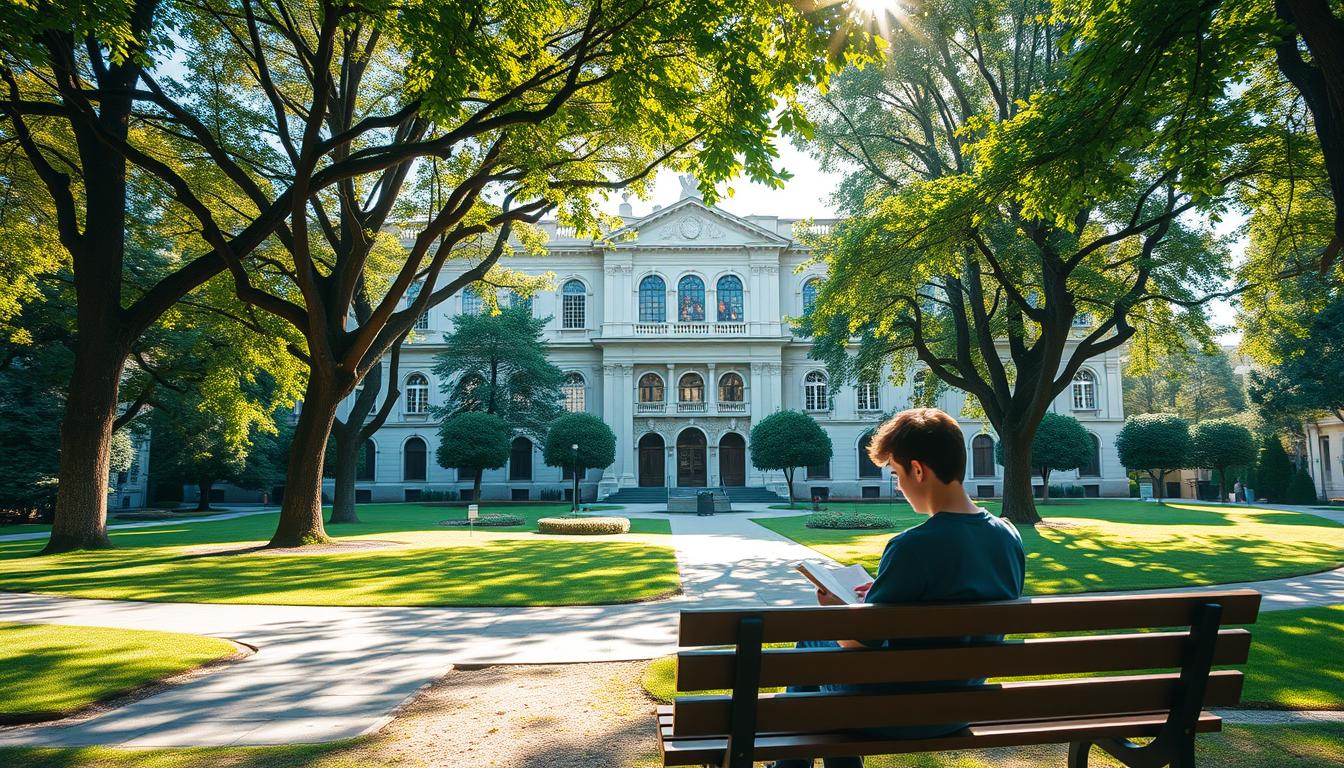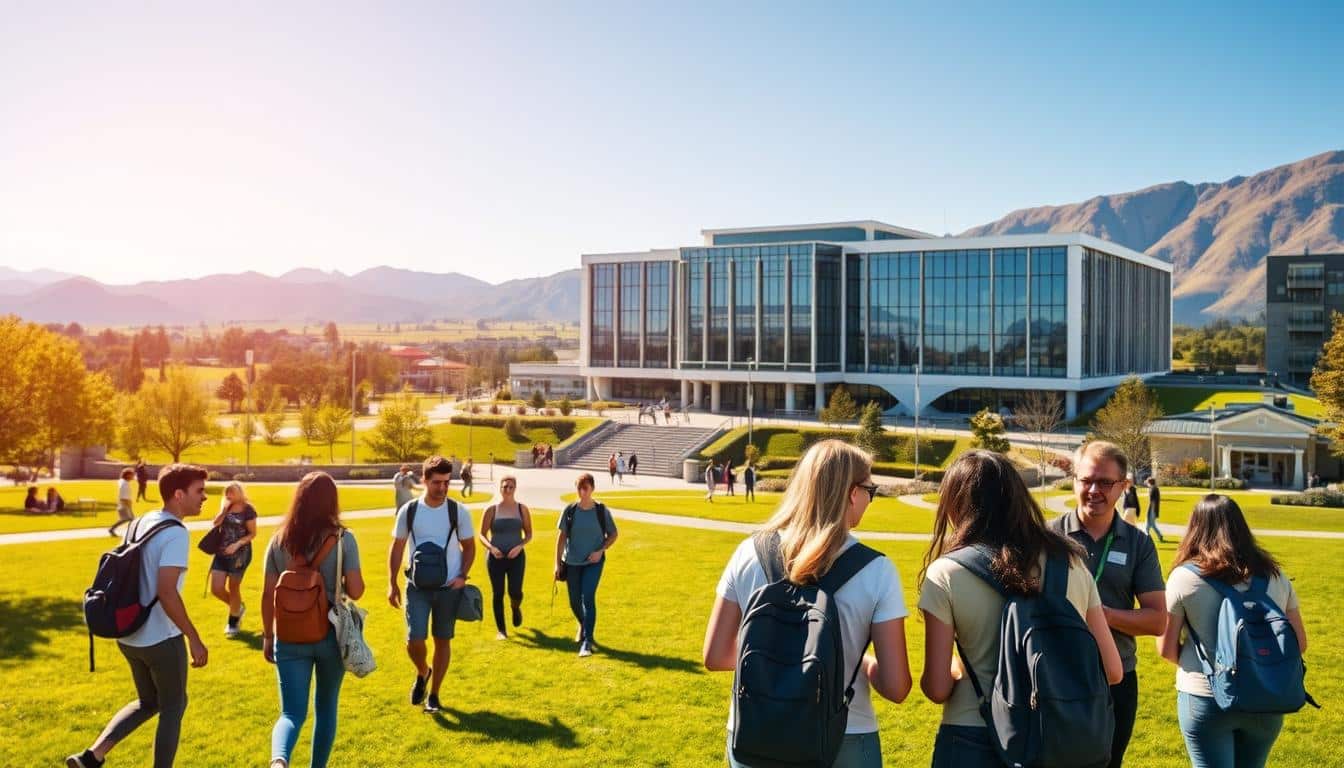Many international students dream of studying abroad, and financial aid can make this possible.
Anúncios
Strategic planning is key to securing funding for education. This guide helps applicants understand the process and improve their success rates.
Different types of financial support are available, from merit-based awards to need-based grants. Each has unique requirements, deadlines, and selection criteria. Knowing these details early can give students an advantage.
Anúncios
South African learners aiming for overseas education should research thoroughly. Proper preparation increases the chances of winning awards. Expert tips and a structured approach can turn aspirations into reality.
For more information, explore the official scholarship website mentioned in this article:
You will be redirected to another website
Introduction to USA Scholarships for International Students
Financial aid transforms aspirations into reality for global scholars. Over a million international students enroll in U.S. institutions annually, supported by $200M+ in funding. Strategic planning helps applicants navigate this competitive landscape.
The American education system offers unparalleled career opportunities. Degrees from U.S. universities are recognized worldwide, boosting employability. For South African applicants, however, tuition and living costs pose significant challenges.
Funding sources vary widely:
| Type | Eligibility | Coverage |
|---|---|---|
| Public Grants | Merit or need-based | Partial to full tuition |
| Private Awards | Field-specific | Stipends + fees |
Cultural adaptation plays a key role in successful applications. Committees value candidates who demonstrate cross-cultural awareness. Highlighting this in essays can set applicants apart.
Types of USA Scholarships Available
Diverse funding sources exist for students aiming to study at top global institutions. Each category—government, university, and private—has unique benefits and eligibility criteria. Understanding these distinctions helps applicants target the right opportunities.
Government-Funded Awards
The Fulbright Foreign Student Program is a flagship example, covering full tuition and living stipends. Federal initiatives often prioritize academic merit and cross-cultural exchange. African students may qualify for regional-specific grants like the African Leaders Program.
University-Specific Financial Aid
Top institutions like Harvard offer MBA awards based on leadership potential. Ivy League schools frequently provide need-blind admissions with full funding. Smaller colleges may have partial awards tied to academic performance or extracurricular achievements.
Private and Corporate Sponsorships
Organizations like Rotary International fund specialized programs (e.g., Rotary Peace Fellowships). Corporate sponsors often support STEM or business fields. Key differences include:
- Full funding: Covers tuition, housing, and travel.
- Partial awards: May require supplemental income or loans.
South African applicants should research deadlines early, as private programs often have rolling applications.
Top USA Scholarships for Undergraduate Students
Undergraduate awards provide crucial support for global learners pursuing degrees abroad. These programs reduce financial barriers while fostering academic excellence. South African students can leverage tailored opportunities to fund their studies.
Illinois Wesleyan University Awards
Illinois Wesleyan University offers $16,000–$30,000 annually to high-achieving candidates. Applications close March 15, with renewal contingent on maintaining a 3.0 GPA. The merit-based selection prioritizes leadership and community engagement.
Berea College Funding
Berea College covers 100% of first-year costs through its no-tuition promise. International scholars participate in a work-study program, gaining practical experience. This need-based initiative requires early application due to limited slots.
University of Memphis Opportunities
The university international program at Memphis waives tuition differentials for non-residents. Awards range from $5,000 to full tuition, depending on academic performance. South African recipients often highlight the program’s cultural support networks.
Strategic applications increase success rates. Merit-based candidates should emphasize academic records, while need-based applicants must document financial circumstances. One Johannesburg student secured funding at Berea by showcasing entrepreneurial initiatives.
Top USA Scholarships for Graduate Students
Exceptional academic candidates can access prestigious awards for master’s and doctoral programs. These opportunities reduce financial barriers while fostering research excellence. South African applicants should prioritize programs aligning with their field and long-term goals.
Fulbright Scholarships
The Fulbright Foreign Student Program supports advanced studies across disciplines. South African applicants undergo a two-phase process: national screening followed by U.S. committee review. Successful candidates receive full tuition, living stipends, and research funding.
Key requirements include:
- Academic transcripts with a minimum 3.0 GPA
- Research proposal aligned with host institution expertise
- Letters of recommendation emphasizing leadership potential
Stanford University Scholarships
Stanford’s Knight-Hennessy Scholars program covers graduate studies for emerging global leaders. Awards include tuition, housing, and a travel stipend. The selection prioritizes interdisciplinary collaboration and societal impact.
“We seek candidates who redefine boundaries across fields.”
AAUW International Fellowship Program
This initiative awards $18,000–$30,000 annually to women pursuing STEM or social science research. Preference goes to applicants demonstrating commitment to gender equality. Required documents:
- Proof of enrollment in an accredited U.S. institution
- Detailed budget plan
- Two reference letters from academic supervisors
Networking with alumni associations can strengthen applications. Many awardees credit mentorship for their success.
MBA and Postgraduate Scholarships in the USA
Business school aspirants can access premier funding options for advanced studies. These programs combine financial support with career development opportunities, particularly for international candidates. Competitive awards often cover tuition, living expenses, and professional networking.
Harvard University MBA Scholarship
The Harvard Business School fellowship provides $102,000 over two years for exceptional candidates. Selection criteria emphasize:
- Academic excellence (750+ GMAT or equivalent GRE)
- Demonstrated leadership in professional settings
- Commitment to community impact projects
Recipients gain access to exclusive mentorship programs and corporate recruitment events. South African applicants should highlight cross-border business initiatives in their essays.
Rotary Peace Fellowships
This rotary peace initiative funds conflict resolution studies across six global universities. The program features:
- Multi-country fieldwork in peacebuilding hotspots
- Stipends covering all academic and travel expenses
- Alumni network spanning 115 countries
Applications require a detailed proposal addressing current geopolitical challenges. Fluency in multiple languages strengthens candidacy.
Onsi Sawiris Scholarship
Egyptian and African nationals receive full funding for STEM or business degrees through this award. Key components include:
- Minimum 3.5 GPA in undergraduate studies
- Proof of intent to contribute to home country development
- Interview demonstrating innovative problem-solving skills
“We invest in visionaries who’ll drive Africa’s economic transformation.”
Post-graduation, scholars join an entrepreneurial incubator with seed funding opportunities.
PhD and Postdoctoral Scholarships in the USA
Advanced research candidates pursuing doctoral and postdoctoral studies have access to specialized funding programs. These initiatives support groundbreaking work across disciplines, from humanities to STEM fields. South African scholars can leverage these opportunities to advance their academic careers.
Jefferson Scholars Foundation National Fellowship
The Jefferson Scholars program funds archival research at the University of Virginia. Fellows receive:
- $25,000 annual stipend
- Access to rare historical collections
- Networking with leading humanities scholars
Applications require a detailed research proposal and two published works. The selection committee prioritizes projects with interdisciplinary impact.
Helen Hay Whitney Fellowships
This award supports biomedical study with lab placements at top institutions. Key features include:
| Benefit | Details |
|---|---|
| Funding | $60,000 over three years |
| Eligibility | Early-stage postdoctoral researchers |
South African applicants often highlight experience in infectious disease research. The program includes mentorship from Nobel laureates.
IIE-SRF Fellowship
The Institute of International Education’s Scholar Rescue Fund aids persecuted academics. It provides:
“Emergency grants and safe placements at partner institutions worldwide.”
Recipients receive $25,000 plus health insurance. Visa sponsorship is arranged through host universities. Applications are reviewed quarterly.
Doctoral candidates should note publication requirements vary by program. Some demand peer-reviewed articles, while others accept conference papers. Early preparation is crucial for meeting deadlines.
Partially Funded Scholarships in the USA
Partial funding options provide a strategic pathway for students balancing academic aspirations with financial constraints. These awards cover a portion of costs, requiring careful planning to supplement remaining expenses. For South African applicants, combining multiple partial awards can make overseas education feasible.
Fairleigh Dickinson University Scholarships
Fairleigh Dickinson offers merit-based awards ranging from $5,000 to $25,000 annually. Renewable criteria include maintaining a 3.0 GPA and full-time enrollment. International students often pair these with external grants for fuller coverage.
University of Mississippi Scholarships
Mississippi’s automatic merit system awards $3,900–$23,000 based on high school GPA. No separate application is needed for initial consideration. Recipients highlight the program’s transparency and predictable funding structure.
Boston University Presidential Scholarship
BU’s $25,000/year award renews for four years with a 3.0 GPA. Competitive applicants demonstrate leadership in extracurriculars or community service. One Cape Town recipient combined this with a local bursary to cover 80% of costs.
Budgeting tips for partial awards:
- Compare living expenses across cities—urban campuses often cost more.
- Seek work-study positions to offset uncovered fees.
- Apply early for need-based institutional aid.
How to Apply for USA Scholarships
Navigating the scholarship application process requires careful planning and attention to detail. Each step—from research to submission—impacts success rates. International applicants, especially from South Africa, benefit from tailored strategies.
Researching the Right Scholarship
Start by identifying awards matching your academic goals and eligibility. Use university portals and databases like Fastweb to filter opportunities. Key factors to compare:
| Factor | Why It Matters |
|---|---|
| Eligibility | Ensures alignment with your profile |
| Coverage | Determines financial feasibility |
| Deadline | Avoids last-minute rushes |
Stanford’s Knight-Hennessy Scholars program, for example, closes on October 9, 2024, for the 2025 intake. South African students should account for time zone differences when submitting.
Preparing Your Application Materials
Gather documents early to avoid delays. Common requirements include:
- Authenticated academic transcripts (translated if necessary)
- Recommendation letters highlighting leadership or research
- A tailored statement of purpose
“Strong applications showcase both achievement and potential.”
Meeting Deadlines and Requirements
Submit applications at least two weeks early to address technical issues. Track submissions using spreadsheets or tools like Trello. Rolling admissions programs favor early applicants.
For South African students, notarizing documents may add processing time. Plan accordingly to meet strict deadlines.
Essential Documents for Scholarship Applications
A strong application requires careful preparation of essential documents. Missing or incomplete paperwork can delay approvals or lead to rejection. South African applicants should prioritize authenticity and relevance for each submission.
Academic Transcripts and Certificates
Official records must reflect consistent performance. South African Qualifications Authority (SAQA) evaluation is mandatory for local credentials. Key tips:
- Submit translated copies if originals are not in English.
- Notarize documents to verify authenticity.
Letters of Recommendation
Choose recommenders familiar with your academic and leadership strengths. Professors or employers should highlight:
| Subject | Eligibility |
|---|---|
| Academic Potential | From faculty in your field |
| Professional Skills | Supervisors or mentors |
Statement of Purpose or Personal Essay
Essays should align with the program’s goals. Common prompts include:
“Describe how your education will address challenges in your home country.”
Arts applicants should prepare portfolios showcasing 5–10 relevant works. Digital submissions often require specific file formats.
Tips for Writing a Winning Scholarship Essay
A compelling essay can be the deciding factor in scholarship selections. Committees look for narratives that reveal character, resilience, and alignment with their mission. A well-structured story often outweighs generic achievements.
Structuring Your Essay
The CAR method (Challenge-Action-Result) creates engaging arcs. Describe a problem faced, steps taken to resolve it, and measurable outcomes. For example:
- Challenge: Limited STEM resources in a local school.
- Action: Founded a coding club with donated laptops.
- Result: 30% of participants pursued tech studies.
Highlighting Your Achievements
Quantify impact to stand out. Instead of “helped my community,” specify “organized a fundraiser serving 200+ families.” Reviewers prioritize applicants who demonstrate initiative.
“We remember stories, not statistics—show us how you’ve grown.”
Tailoring Your Essay to the Scholarship
Research the sponsor’s values. A healthcare program might prioritize empathy, while a tech award favors innovation. Mention how your goals align with their vision for the country.
Avoid plagiarism pitfalls. Authenticity resonates more than borrowed phrases. Tools like Turnitin scan submissions, so originality is key.
Common Mistakes to Avoid in Scholarship Applications
Avoidable errors often derail promising applications before review. Over 30% of submissions are rejected annually for preventable issues. Proactive planning helps students sidestep these pitfalls.
Missing Deadlines
Time management is critical. Many applicants overlook time zone differences or last-minute technical glitches. Tools like World Time Buddy simplify conversions.
Key strategies:
- Set reminders two weeks before the deadline.
- Submit early to allow for corrections.
Incomplete Applications
Missing documents account for most rejections. South African candidates often forget country-specific requirements like SAQA evaluations.
Custom checklists should include:
- Notarized academic records
- Proof of English proficiency
Generic Essays and Materials
Committees spot recycled content instantly. AI-generated essays risk detection tools like Turnitin. Tailor each submission to the course or program’s values.
“A standout essay reflects genuine passion, not just achievements.”
Follow-up emails confirming receipt show professionalism. Avoid excessive reminders—one polite inquiry suffices.
Maximizing Your Chances of Securing a Scholarship
Strategic preparation separates successful applicants from the competition. Award committees evaluate hundreds of profiles, seeking candidates who stand out academically and personally. South African students can improve outcomes by focusing on three core areas.
Building a Strong Academic Profile
U.S. institutions often require GPA conversions for international transcripts. The WES iGPA calculator helps translate South African marks to a 4.0 scale. Competitive applicants typically maintain:
- 80%+ average for merit-based awards
- Consistent improvement in core subjects
- Advanced coursework in their field
Summer programs at local universities can demonstrate commitment to study. Many U.S. colleges accept transfer credits from accredited African institutions.
Gaining Relevant Experience
Internships with multinational companies carry significant weight. Programs like:
- Standard Bank Africa internships
- UN Global Compact initiatives
- Google Africa developer scholarships
provide verifiable experience. One Johannesburg student secured funding by documenting leadership in a township education project.
“We value applicants who apply classroom knowledge to real-world challenges.”
Networking and Seeking Guidance
Connecting with alumni from target schools yields insider perspectives. LinkedIn outreach should:
- Reference shared academic interests
- Request informational interviews
- Follow up with thank-you notes
Many universities offer mentorship programs pairing current students with applicants. These relationships often continue through the degree program.
Understanding Scholarship Deadlines
Timing plays a crucial role in securing educational funding. Many applicants miss opportunities simply by misunderstanding submission windows. Strategic planning around these dates can significantly improve success rates.
Early Application Advantages
Submitting before priority deadlines often yields better results. Committees frequently review early applications more thoroughly. The Fulbright Foreign Student Program for 2025-26, for example, opens in April 2024.
Key benefits of early submission:
- More time for visa processing (critical for South African students)
- Higher chances of securing interviews
- Access to rolling admission advantages
Rolling Deadlines vs. Fixed Deadlines
Rolling admissions evaluate applications as they arrive. Fixed deadlines have strict cutoff dates. Understanding this distinction helps applicants prioritize submissions.
| Type | Strategy |
|---|---|
| Rolling | Submit within first 30 days of opening |
| Fixed | Aim for 2-week pre-deadline submission |
“Programs with rolling admissions often exhaust funds before final deadlines.”
Planning Your Application Timeline
Create a master calendar tracking all course and funding dates. South African applicants should account for:
- Document authentication timelines (SAQA evaluations take 4-6 weeks)
- Time zone differences for online submissions
- Potential deferral policies
Sync multiple study applications by color-coding deadlines. Waitlist management requires prompt response to acceptance offers.
Financial Planning for Studying in the USA
Smart budgeting opens doors to academic dreams abroad. While awards cover tuition, living costs require separate planning. South African students often underestimate expenses like healthcare and transportation.
Estimating Costs Beyond Tuition
Average annual living expenses range $12,000-$18,000 across different U.S. regions. Urban campuses like New York cost 30% more than rural areas. Essential non-tuition expenses include:
| Expense | Annual Cost | Cost-Saving Tip |
|---|---|---|
| Health Insurance | $1,500-$3,000 | Compare university-sponsored plans |
| Textbooks | $900-$1,200 | Buy international editions |
| Transportation | $500-$1,500 | Use student discount programs |
F-1 visa holders must maintain full health coverage. Some schools include this in tuition fees, while others require separate purchases.
Exploring Additional Funding Options
South African Reserve Bank allows up to R1 million annual forex allowance for study purposes. Students can supplement funding through:
- On-campus jobs (max 20 hrs/week during terms)
- Curricular Practical Training in related fields
- Freelance work compliant with visa rules
“Always verify employment terms with your international student office.”
Managing Living Expenses
Tax treaties between countries may exempt certain awards from taxation. Practical strategies include:
- Sharing apartments near campus
- Using public university meal plans
- Purchasing second-hand furniture
South African students report saving 15-20% by cooking traditional meals instead of eating out. Always budget for winter clothing in colder states.
Resources for Finding More USA Scholarships
Smart researchers cast wide nets when hunting for financial support. The most successful applicants combine traditional searches with creative outreach. These methods uncover opportunities others miss.
University Financial Aid Offices
Top institutions maintain dedicated teams to help students fund their studies. These offices know about department-specific awards not listed publicly. Building relationships with advisors often yields insider tips.
Key strategies when contacting them:
- Ask about endowed funds for specific majors
- Request meetings with international student advisors
- Inquire about work-study programs
Online Scholarship Databases
Verified platforms streamline the search process. These services match profiles with relevant awards:
| Platform | Specialization |
|---|---|
| Fastweb | General undergraduate funding |
| Cappex | College-specific awards |
| Scholarships.com | Corporate-sponsored programs |
Create alerts for new postings matching your criteria. Many South African students find niche awards through these tools.
Government and Embassy Resources
The US Embassy in Pretoria offers free EducationUSA advising services. Many country-specific agreements exist, like the USAID partnerships for African students.
“Bilateral education agreements often cover fields critical to national development.”
Additional channels to explore:
- Department of Higher Education bilateral programs
- Provincial education office notices
- Alumni networks of previous award recipients
Always verify legitimacy before sharing personal information. Reputable programs never ask for upfront payments.
Conclusion
Securing financial support for overseas study requires strategy and persistence. Successful applicants combine strong academics with tailored applications. They highlight unique strengths that align with each program’s goals.
For international students, the journey doesn’t end with an award letter. Networking with alumni opens doors to future opportunities. Many recipients find mentors who guide them through their academic careers.
Before submitting, double-check these:
- All required documents are complete and verified
- Essays reflect personal experiences, not generic statements
- Recommendation letters speak to specific qualifications
The search for funding continues throughout one’s education. New programs emerge annually, offering fresh chances to reduce financial burdens. Stay proactive, and your efforts will pay off.
FAQ
What types of financial aid are available for international students in the USA?
International students can access government-funded awards, university-specific grants, and private organization sponsorships. These include merit-based, need-based, and program-specific opportunities.
How competitive are Rotary Peace Fellowships for graduate studies?
Rotary Peace Fellowships are highly selective, accepting only 50-100 candidates annually. Applicants must demonstrate leadership experience and a commitment to peacebuilding.
Can undergraduates apply for Fulbright scholarships?
Fulbright primarily supports graduate-level studies, though some undergraduate exchange programs exist. Most applicants pursue master’s or PhD degrees.
What makes a strong scholarship essay?
Winning essays showcase unique personal narratives, align with the sponsor’s mission, and demonstrate clear academic or career goals. Specific examples strengthen applications.
Do all universities require standardized test scores?
A> Many institutions have adopted test-optional policies, particularly for international applicants. Always check individual program requirements before applying.
How early should students begin scholarship research?
Ideal preparation starts 12-18 months before intended enrollment. This allows time to meet language requirements, gather documents, and refine application materials.
What financial documents do sponsors typically require?
A> Most applications need bank statements, sponsorship letters, or financial guarantee forms. Some awards require proof of funds for visa processes.
Can students combine multiple awards?
A> Policies vary by institution. Some universities adjust financial packages if external funding is secured, while others permit stacking of certain scholarships.
Where can applicants find verified scholarship listings?
A> University financial aid offices, EducationUSA centers, and platforms like IIE and InternationalScholarships.com provide reliable databases of opportunities.






